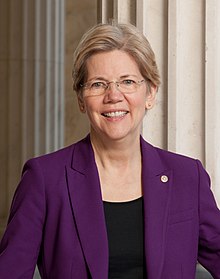U.S. Senator Elizabeth Warren releases DNA test results, asks Donald Trump to make promised donation
Thursday, October 18, 2018
United States Senator Elizabeth Warren released to newspaper The Boston Globe on Sunday, with public statement following on Monday, the results of a DNA test suggesting she has somewhere from 1/64 to 1/1024 Native American ancestry. She took the test in response to a dare from U.S. President Donald Trump, who promised at a rally this July to donate USD1 million to a worthy cause if she could prove she had Native American genes, as she claimed.

Image: United States Senate.
Warren on Monday reminded Trump of his offer publicly on Twitter: "By the way, @realDonaldTrump: Remember saying on 7/5 that you'd give $1M to a charity of my choice if my DNA showed Native American ancestry? I remember – and here's the verdict. Please send the check to the National Indigenous Women's Resource Center".
Trump responded by telling the press "I didn't say that. You better read it again." He later added he would only write the check if he could personally test Warren's DNA himself, adding "That will not be something I enjoy doing, either."
An aide to Warren said her DNA was collected in August. It was tested by Stanford University professor and genetics expert Carlos D. Bustamante, who did not know whose sample he was analyzing at the time. Accoriding to Bustamante's report, "While the vast majority of the individual's ancestry is European, the results strongly support the existence of an unadmixed Native American ancestor in the individual's pedigree, likely in the range of 6-10 generations ago." Bustamante himself told the press about a stretch of genes on Warren's 10th chromosome. "We found five segments, and that long segment was pretty significant. It tells us about one ancestor, and we can't rule out more ancestors. [...] We are confident it is not an error."
Chuck Hoskin Jr., Secretary of State of the Cherokee Nation, voiced a concern: "Using a DNA test to lay claim to any connection to the Cherokee Nation or any tribal nation, even vaguely, is inappropriate and wrong. [...] Senator Warren is undermining tribal interests with her continued claims of tribal heritage."
Democratic strategist Steve Elmendorf told the press, "She is most clearly doing the things you do if you're running for president."
Teaching from 1987 to 1995 at the University of Pennsylvania, Warren identified there as Native American, and again at Harvard University, where she served as a professor. This fact re-emerged during her 2012 campaign for the senate, drawing some criticism. President Trump has sarcastically referred to Senator Warren by the nickname "Pocahontas" after the famous Powhatan Indian chief's daughter. Warren has said she identified as Native American during that part of her life because that was when her older female relatives were dying and she wanted to feel closer to her family history. Warren said on Monday via Twitter, "DNA & family history has nothing to do with tribal affiliation or citizenship, which is determined only – only – by Tribal Nations. I respect the distinction, & don't list myself as Native in the Senate."
In the 1980s and 1990s, universities like Harvard and Penn were under pressure to show they had minorities on staff. Warren recently released employment documents to The Boston Globe that reportedly indicated her purported ethnicity did not affect her career.
Warren's family's history names a great-great-great grandmother called O.C. Sarah Smith. She is listed as white on period documents, but Warren's family maintained she was, in some degree, Native American.
Bustamante's report notes searching DNA for Native American ancestry is difficult because the databases of known Native American DNA to which to compare samples are relatively small. Some tribal authorities have asked their members not to participate in genetic studies because of exploitation and misuse by scientists in the past. In one case, beginning in 1989, hundreds of Havasupai Indians provided blood samples to researchers from the University of Arizona who claimed they were performing a study on diabetes, from which many Havasupai suffered. The donors later learned their samples were used not only for diabetes but for other disease studies and for migration studies that contradicted the tribe's traditional stories about its origin. This was without the donors' knowledge or permission, in violation of standard medical ethics. This led to the Havasupai Tribe vs. the Arizona Board of Regents lawsuit, which was settled in 2010. Warren's sample was tested against samples from Mexico and South America believed to have genetic markers in common with Native Americans from what is now the United States.
Sources
- Erica Y. King. "Elizabeth Warren releases DNA analysis showing 'strong evidence' of Native American ancestry" — ABC News (US), October 15, 2018
- Bob Salsberg, Eileen Putman, Ken Thomas (AP). "Sen. Warren: DNA test shows I have Native American heritage" — The Saratogian, October 15, 2018
- Annie Linskey. "Warren releases results of DNA test" — Boston Globe, October 15, 2018
- Robyn L. Sterling. "Genetic Research among the Havasupai: A Cautionary Tale" — American Medical Association Journal of Ethics, February 2011


